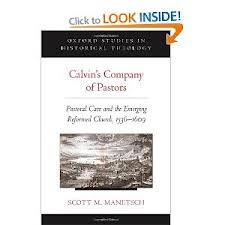In the company of pastors: why you should buy Scott Manetsch's new book

February 15, 2013
 Years ago, while teaching at a British university, I recall a colleague complaining one day about a review of one of his books which said that it should be read by all pastors. He was a bit upset by this, apparently on the grounds that the reviewer was implying that he had not been sufficiently scholarly (read: abstruse) to render his argument beyond the grasp of the non-specialist. I hope -- indeed, I know -- that Scott Manetsch, Professor of Church History at TEDS, is cut from better cloth because his book, Calvin's Company of Pastors: Pastoral Care and the Emerging Reformed Church, 1536-1609 (OUP) is exactly that: a scholarly book which really ought to be read by pastors. And I trust he will take that as the highest form of praise. Yes, the book is not cheap; but if it is beyond reach, then try to obtain a copy through a library.
Years ago, while teaching at a British university, I recall a colleague complaining one day about a review of one of his books which said that it should be read by all pastors. He was a bit upset by this, apparently on the grounds that the reviewer was implying that he had not been sufficiently scholarly (read: abstruse) to render his argument beyond the grasp of the non-specialist. I hope -- indeed, I know -- that Scott Manetsch, Professor of Church History at TEDS, is cut from better cloth because his book, Calvin's Company of Pastors: Pastoral Care and the Emerging Reformed Church, 1536-1609 (OUP) is exactly that: a scholarly book which really ought to be read by pastors. And I trust he will take that as the highest form of praise. Yes, the book is not cheap; but if it is beyond reach, then try to obtain a copy through a library. Why do I say this will be useful to pastors? Well, the Reformation fundamentally changed the nature, tasks and power of the pastoral office, primarily by placing the Word at the centre, theologically and thereby practically, of church life. Further, this dramatic change itself brought challenges which themselves required furthered changes and refinements in the understanding and practice of pastoral ministry. Scott uses the Company of Pastors in Geneva to trace such matters over a period of nearly 75 years. If you want to understand something of why your job as a Reformed or Presbyterian pastor looks the way it does today, this book will be immensely helpful.
 The chapter on the ministry of the word, examining Genevan approaches to preaching, is very useful. The emphasis Calvin and company placed on clarity is one which can never be stressed enough: the pulpit is not the place to show off learning; it is the place to use that learning as the hidden foundation for preaching sermons which make the Bible's message clearer, not more opaque and inaccessible. Oratorical skills are useful but only in so far as necessary for giving the message clarity and power, not for drawing attention to the preacher.
The chapter on the ministry of the word, examining Genevan approaches to preaching, is very useful. The emphasis Calvin and company placed on clarity is one which can never be stressed enough: the pulpit is not the place to show off learning; it is the place to use that learning as the hidden foundation for preaching sermons which make the Bible's message clearer, not more opaque and inaccessible. Oratorical skills are useful but only in so far as necessary for giving the message clarity and power, not for drawing attention to the preacher.Scott's attention to the records of the Consistory and the Company will also encourage by showing you that Geneva, Knox's 'most perfect school of Christ' was not actually that perfect. The problems which dog ministry today, from ruthlessly ambitious pastors to relentless and small-minded critics to sexually incontinent parishioners and all points in between, are staples of church experience. You have it no worse than those who have preceded you.
 The Consistory records also show that discipline in Geneva was not the Gestapo-style brutality of popular myth; rather it was nuanced and frequently took much account of the humanity and the individual circumstances of the individuals concerned. Indeed, the text is littered with anecdotes of touching human interest, most notably the tragic case of the woman abandoned to an agonising death in childbirth by friends and family because she had the plague. In such cases, the Company and the Consistory shone in their concern for human dignity and for the weak and vulnerable. The ridiculously simplistic cynicism of the 'all church discipline is about social control' school is quietly put to the sword, exposed for the tendentious nonsense it so often is.
The Consistory records also show that discipline in Geneva was not the Gestapo-style brutality of popular myth; rather it was nuanced and frequently took much account of the humanity and the individual circumstances of the individuals concerned. Indeed, the text is littered with anecdotes of touching human interest, most notably the tragic case of the woman abandoned to an agonising death in childbirth by friends and family because she had the plague. In such cases, the Company and the Consistory shone in their concern for human dignity and for the weak and vulnerable. The ridiculously simplistic cynicism of the 'all church discipline is about social control' school is quietly put to the sword, exposed for the tendentious nonsense it so often is.One point which surprised me: in Geneva, urban ministry was already the preferred option of many. I had assumed that this preference was something which arose in the nineteenth century, when the Industrial Revolution helped to secure cities a top rank in the market of cultural cool. Not so. The urban ministry preference was there in the sixteenth century because that was where the best ministerial perks were to be found and those thought to be the most interesting and sophisticated people lived. Rural pastorates were seen as training grounds for those city calls which successful and talented pastors would ultimately receive. They were also much harder work. Yet again, there is nothing new under the sun, it seems -- though it also appears that members of the Company of Pastors did not try to gloss their preference with specious claims of eschatological significance for urban environments and city dwellers.
Perhaps most striking and intriguing are Scott's references to Beza. The man maligned as the coldly logical systematiser of Calvin's theology was anything but: as scholarship has debunked the allegations of his logic-chopping, so Scott paints a picture of a cultured, urbane, popular man. I hope that Scott might consider doing a full-scale biography of Beza as his next project.
One small error I spotted: on. p. 256, Scott has Luther reducing the sacraments from seven to two in his 1520 treatise, On the Babylonian Captivity of the Church. Luther is a little ambiguous on the status of penance in this work, but I think the fairest reading has him still with three sacraments at this point. Still, that is an almost pedantic quibble.
This is a quite superb book. It is not only outstanding as a well-written piece of original historical research. It is also most informative concerning the reasons why Reformed and Presbyterian churches came to think about the ministry in the ways they do. Buy it -- though, if you are a pastor, probably best not to tell your wife how much it cost.





